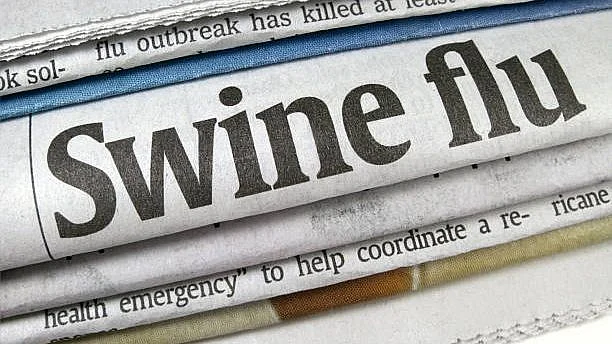A rise in cases of H1N1 flu, also called swine flu, has prompted health officials to advice caution.
Since 15 July, Mumbai and its neighbouring districts have reported 62 cases of H1N1 flu. 16 cases have also been confirmed in Nagpur, according to the Nagpur Municipal Corporation.
Following the spurt in cases, Mumabi health authority, BMC, issued an advisory alerting high-risk categories of people.
Why are we seeing a rise in cases now?
On top of COVID-19, and the looming threat of Monkeypox, is this rise in cases of H1N1 flu likely to pose another challenge?
FIT speaks to experts.
Before we look at why we are seeing an increase in cases of H1N1 flu, here's a refresher on what it is.
The H1N1 flu, Influenza A, or swine flu is a respiratory infection which jumped from pigs to humans, as the name suggests.
According to the Mayoclinic, symptoms of swine flu are the same as seasonal flu, which typically include fever, chills, cough, sore throat, body ache.
Now, swine flu isn't a new illness. In fact, since the H1N1flu pandemic in 2009, the illness has been declared an endemic - an illness regularly found in certain areas.
So, a rise in cases of swine flu, particularly in the monsoon months of June to August is not unusual, says Dr Kirti Sabnis, Infectious Disease Specialist at Fortis Hospital, Mumbai.
However, this year, cases have been the highest recorded in three years. Dr Sabnis also adds that this year, they have been seeing higher ICU admissions as well.
Why Are H1N1 Cases Increasing?
Maharashtra, has in the past too, been an epicentre of swine flu outbreaks — first in 2009, then in 2012, and even 2017.
In fact, "we see cases of H1N1 cases every year," says Dr Laxman Jessani, consultant, infectious disease specialist, Apollo hospitals, Navi Mumbai.
Dr Jessani, too notes that despite it being a season occurrence, "this year cases are on the higher side."
Dr Sabnis suspects that one reason for the sudden spurt in cases after a couple of years of lull, could be that during the pandemic, people were using good protection against COVID, which indirectly helped prevent the spread of other viruses as well.
"So far we are seeing mostly mild cases, but those people who have comorbidities, heart problems, diabetes, in those people we are seeing a higher rate of H1N1 disease, and even complications."Dr Laxman Jessani, consultant, infectious disease specialist, Apollo hospitals, Navi Mumbai
Although not all ICU admitted patients have comorbidities, according to Dr Sabnis, "around 80 percent of (H1N1) patients getting admitted to the ICU have some or the other immunocompromising condition, or lung problem like COPD."
Speaking of 'high-risk' patients, Dr Sabnis says that those most vulnerable to severe disease are the elderly, and immunocompromised individuals. Children, she adds, are less likely to get ill.
How Can You Protect Yourself?
If the COVID pandemic years have taught us anything, it is that flu is preventable with basic measures of hand hygiene and masking.
H1N1 flu is similar to COVID in that they are both respiratory illnesses, have an overlap in symptoms, and they both spread in a similar way, so keeping up COVID appropriate behaviour is your best bet at keeping swine flu at bay as well, according to the experts.
Both experts urge getting vaccinated.
"We have to make sure that we get our population vaccinated, because the disease is easily preventable with vaccines."Dr Laxman Jessani, consultant, infectious disease specialist, Apollo hospitals, Navi Mumbai
"In the last two years, people were more focused on getting the COVID vaccine and other vaccines like flu and pneumonia took a backseat," says Dr Sabnis.
The annual quadrivalent flu shot, she says, works against four variants of the influenza virus, including H1N1, she says.
"H1N1 is here to stay, so it's better we take our annual flu shot and prevent the disease," adds Dr Jessani.

